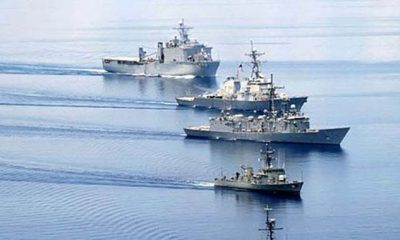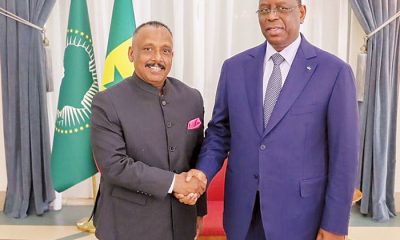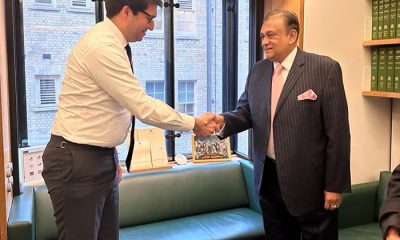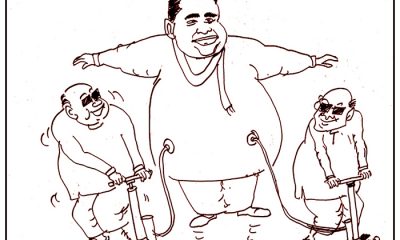Editorial
Lean and Mean approach needed for our overseas missions

In an unusual cartoon illustrated spread taking up more than half its front page last Tuesday, the Daily Mirror splashed the news of the impending appointment of Mr. Rohitha Bogollagama, a former foreign minister, as Sri Lanka’s new High Commissioner to the United Kingdom. He replaces Ms. Saroja Sirisena, a career diplomat widely regarded as having done a good job in an overseas mission considered among the more important maintained by post-Independent Ceylon/Sri Lanka. The headline of that lead story blared: “Sri Lanka’s Foreign Service: A Den of Political Appointees.” The accompanying cartoon showed Bogollagama, with a pottaniya slung on a stick across his shoulder, astride an aircraft with a globe as the background.
That news spread undoubtedly resonated in the minds and heart of readers, disgusted by the way in which this small country, now in the grips of an unprecedented economic crisis, has over the decades lavished scarce resources on its many overseas missions – high commissions in Commonwealth countries, embassies and consulates in others.
We squander foreign exchange resources we can ill afford on often unnecessary overseas missions that any simple cost: benefit analysis will amply demonstrate makes no sense whatever. And on top of all that, politicians widely disliked by the polity that created them for many good reasons, are pampered at such missions with ambassadorial appointments with lavish perquisites. Many of them have preferred these to high political, including cabinet office, back in the home country. Apart from that, political panjandrums have frequently had their progeny, sometimes spouses and other favorites appointed to Sri Lanka’s overseas missions at the cost of the professional diplomatic service.
Bogollagama has at different times in his political career belonged to the UNP, the SLFP, UPFA and whatever, always benefiting personally from such connections. Apart from his stints in the cabinet, he served as Governor of the Eastern Province and headed several state-owned enterprises. His past extravagances as foreign minister had time and again captured media attention. The Daily Mirror report harks back to some of them including a trip to Brazil which had cost the state an estimated five million rupees (at then money value) and included a vacation in a Rio de Janeiro beach resort.
Another mentions a New York visit by him to join the presidential delegation to a session of the UN General Assembly where he was booked at the luxurious Ritz Carlton hotel. This report goes on to say that the minister’s public relations and private security officers assigned separate rooms had been asked to bunk together to make one room available for the minister’s daughter and her husband who worked in the Sri Lanka’s Washington mission; the report is unclear on who worked for the mission – daughter or husband.
Who was responsible for the Bogollagama appointment is not known. It can be expected that in an appointment as important, and as coveted as this, the president would have a hand. But right now there are two power centers in the government – the presidency and the Rajapaksas’ Sri Lanka Podu Jana Pakshaya (SLPP) where Basil Rajapaksa is widely regarded as the mover and shaker.
The Daily Mirror report said that Bogollagama was handpicked to engage with the Tamil diaspora in the UK where there is a sizable Sri Lankan population. There is no previously demonstrated competence on his part of specific skills in this area. President Wickremesinghe is deeply committed to fast tracking the mending of communal fences but the country is already past the Feb. 4, 2023 deadline he set for himself in this regard.
Political leaders preferring diplomatic assignments overseas to even cabinet appointments at home is not a new development in this country. Older readers will remember that leaders of the stature of Sir Oliver Goonatillake, who late became Governor-General of this country, went to London as Ceylon’s High Commissioner in the post-Independence period.
At that time there were others like Sir Claude Corea, Sir Senerath Gunawardena, Sir Susantha de Fonseka and Labour Party founder-leader A.E. Goonasinha who accepted diplomatic assignments. Most recently, Mr. Mahinda Samarasinghe quit his cabinet ministry to go to Washington as ambassador. President Premadasa is once reputed to have told a politician who preferred an overseas assignment to a junior ministry: “Mama thamuseta ASP kamak denakota, thamusey Constable padaviyak illanwa.” That worthy having served as Deputy High Commissioner in Canada had acquired a taste for diplomatic life.
At various times, notably during Foreign Minister Lakshman Kadirgmar’s tenure as foreign minister, we have heard of a ‘right balance’ between political and professional appointments to the higher levels of the diplomatic service. Discovering the present position in this regard will be a useful exercise. We are not saying that appointments to the country’s overseas missions of persons without foreign service backgrounds is always a bad thing. Ambassador Shirley Amarasinghe, a member of the then elite Ceylon Civil Service shone at the United Nations and was desired globally to chair the UN Law Of The Sea Conference even when then President J.R. Jayewardene refused to let him continue as this country’s Ambassador to the UN. Neville Kanakaratne’s is another name that springs to mind in that regard.
All things said, Sri Lanka surely has more foreign missions than the country can afford. Three of them were closed down in 2021 and there are many more that merit closure. Why we have a mission in the Seychelles is beyond all understanding. Given our current financial predicament, there is no doubt that a seriously ‘lean and mean’ approach is needed on the number for overseas missions we run and how they are staffed. What prevails now is an abomination.
Editorial
“Smell of Power”

Monday 15th December, 2025
The government hurriedly launched a social media campaign on Friday to gain political mileage out of the arrest of NPP MP Asoka Ranwala involved in a road accident. Its propagandists boasted that the rule of law had been restored, and everyone was now equal before the law. But they were left red-faced when Ranwala was granted bail soon afterwards. Worse, it was revealed that the police had not made Ranwala undergo an alcohol test immediately after the accident on Thursday night and waited until Friday noon to do so.
An otherwise articulate Police Spokesman ASP F.U. Wootler cut a pathetic figure when journalists asked him why no alcohol test had been conducted on former Speaker Ranwala immediately after the accident to determine whether he was drunk. The police have trotted out some lame excuses for dragging their feet. Thanks to their subservience to the ruling party, the police always have to defend the indefensible whenever a government politician commits a transgression.
An infant, his mother and grandmother were injured in Thursday’s crash. While the police are drawing heavy fire for the despicable delay in arresting Ranwala and making him take a blood alcohol test, the victims’ family members are demanding justice. JVP/NPP politicians are making various statements and pledges in a bid to obfuscate the issue and mislead the public, but to no avail.
The unfolding Ranwala drama, as it were, reminds us of an accident involving a JVP heavyweight during the Yahapalana government in 2016. JVP MP Vijitha Herath was arrested over a road accident where his vehicle went out of control and crashed into a wayside telephone post. He was subsequently released on police bail. The Judicial Medical Officer reportedly mentioned in his report that Herath had been smelling of liquor at the time of examination. However, the Colombo Additional Magistrate acquitted Herath of the drunk-driving charge in keeping with a legal precedent, but ordered him to pay Rs. 1,500 as state costs. Herath was also ordered to pay Rs. 17,400 for the damaged telephone post. Herath vehemently denied that he had consumed alcohol. The JVP was a partner of the Yahapalana government, in all but name.
Is it that the politicians in power and their kith and kin never drive under the influence of liquor and they only drive while ‘smelling of liquor’! The police ignore that smell. They take alcohol tests, if at all, hours after causing accidents! There are allegations of blood and urine samples being swapped to help the politically-connected suspects evade drunk-driving charges.
The JVP-led NPP has demonstrated that it has no qualms about interfering with the legal process to let its members off the hook in spite of its moral grandstanding and pledges to restore the rule of law. Head of the Retired Police Collective of the JVP/NPP, former Senior DIG Ravi Seneviratne, arrested for causing a multiple vehicle collision under the influence of alcohol in Colombo in 2023, had the drunk driving charge against him dropped after his elevation to the current position. The Police Department is currently under him; a fish is said to rot from the head down.
President Anura Kumara Dissanayake has taken upon himself the unenviable task of mitigating the adverse political impacts of his MPs’ endless blunders and transgressions. It has become a Sisyphean ordeal for him. Now, he will have to rush to Parliament again and try to control the political damage the controversy over Ranwala’s accident has caused to the government. He has to make damage-control speeches at such a rate that while sprinting into Parliament for that purpose, he might collide with himself coming out, as in a cartoon.
Upon witnessing the blatant manipulation of the legal process and the subversion of the ideals of equality and justice under the current dispensation, one wonders why JVP/NPP does not adopt the credo of the pigs in Orwell’s Animal Farm and declare that all Sri Lankans are equal, but those who are JVP/NPP members are more equal than others.
Editorial
Disaster relief and shocking allegations

The government has announced a sweeping compensation package for the Ditwah disaster victims, and the disbursement of money for cleaning the flood-affected houses, is already underway. It is spending funds that belong to the people and not the JVP or the NPP. It must therefore not only disburse state funds responsibly but also be seen to be doing so. Transparency is the most potent antidote to all forms of financial malpractice. Worryingly, complaints abound that government politicians are interfering with relief distribution operations and even diverting funds for the benefit of their supporters.
Sri Lanka United Grama Niladhari Association (SLUGNA) President Nandana Ranasinghe told the media on Monday (08) that JVP/NPP politicians and their supporters were meddling with the ongoing disaster relief programmes at all levels and even obstructing the Grama Niladharis (GNs). He claimed that the political authority had sent letters to the District and Divisional Secretaries, directing them to appoint ruling party members to the state-run welfare centres. SLUGNA Secretary Jagath Chandralal said state officials had been directed to obtain approval from the government members of the Prajashakthi committees for carrying out relief work. On Thursday, addressing the media, Convenor of the Sri Lanka Grama Niladhari Association Sumith Kodikara made a number of similar allegations. He said the NPP politicians were arbitrarily helping their supporters obtain Rs. 25,000 each as compensation. He stressed that only the disaster victims had to be paid compensation, and never had relief programmes been politicised in that manner. These allegations are shocking enough to warrant probes.
Those who are misusing state funds allocated for disaster relief must be arrested and prosecuted under the Offences against Public Property Act. Some Opposition politicians and their family members have been jailed for obtaining fuel allowances fraudulently while in power. So, the offence of misusing funds meant for disaster victims must not go unpunished.
A ruling party politician, in his wisdom, once claimed that all 159 NPP MPs were of the same calibre as the late Foreign Minister Lakshman Kadirgamar. He caused a posthumous affront to Sri Lanka’s nonpareil statesman, whose presence adorned national politics. His egoistic, lofty claim drew derision. However, the government politicians ought to take cognisance of something Kadirgamar said in answer to a question from a BBC journalist about alleged irregularities in the handling of tsunami relief in early 2005. He said that wherever humans and money happened to be together, there was the possibility of corruption, but the then government was doing everything in its power to prevent irregularities in tsunami relief distribution. No truer words can be said about humans and their greed, especially in this country, where some corrupt politicians and officials have stooped so low as to enrich themselves by procuring fake cancer drugs.
No relief or welfare programmes have been devoid of politics in this country. It may be recalled that one of the factors that led to the country’s bankruptcy in 2022 was a politically motivated pandemic relief programme, aimed at enabling the SLPP to garner favour with the public and win the 2020 general election. The interim SLPP government gave away state funds at the rate of Rs. 5,000 per family besides distributing baskets of goods. It won the parliamentary election that followed, but the mismanagement of state funds and the loss of revenue due to ill-conceived tax and tariff reductions had a crippling impact on the economy. One can only hope that there is no truth in the allegation that the NPP government is using the ongoing relief operations to shore up its approval rating and electoral prospects in view of the Provincial Council elections expected next year. Strangely, President Anura Kumara Dissanayake, while announcing the compensation package in Parliament, declared that the families who had suffered even minimal damage to their houses, such the loss of a single roofing sheet, would receive as much as Rs. 1 million as compensation! Sri Lankan politicians are very generous with state funds.
The success of relief and rebuilding programmes hinges on several prerequisites, including transparent allocation of resources, proper coordination, efficient delivery systems, accountability and monitoring, and sustainability and follow-up. No room must be left for partisan politics and the agendas of political parties where relief and rebuilding programmes are concerned.
Editorial
A single swallow wheeling in a gyre

Saturday 13th December, 2025
NPP MP and former Speaker Asoka Ranwala was arrested yesterday over a road accident, where an infant and two women were injured, in Sapugaskanda. He has been charged with dangerous driving and failure to prevent an accident, according to media reports quoting the police. He was in the National Hospital of Sri Lanka, Colombo, at the time of going to press. An attempt is being made in some quarters to have the public believe that the law applies to everyone equally under the current dispensation, but it is said that one swallow does not make a summer.
The police have apparently acted the way they should, where the accident allegedly caused by Ranwala is concerned, but they ought to explain why they baulked at arresting a deputy minister and an NPP mayor facing a fraud charge, and went out of their way to consult the Attorney General instead to buy time. They swiftly arrest Opposition politicians and haul them before courts in double-quick time, don’t they?
One may recall that former Senior DIG Ravi Seneviratne was arrested in 2023 for drunk driving and causing a multiple vehicle collision in Colombo. Thereafter, he joined the NPP’s Retired Police Collective as its head, and had himself appointed Secretary to the Ministry of Public Security, after the NPP’s rise to power, the following year. Now, the drunk driving charge against him has been dropped, according to media reports! This is proof that political interference with the Attorney General’s Department is far from over, and the rule of law is yet to be restored. The police remain putty in the hands of the ruling party politicians, and the Executive is keeping the AG’s Department under his thumb.
Hundreds of JVP supporters broke their journey on the Southern Expressway, of all places, on their way to their party’s May Day rally this year. Several buses carrying them were seen parked in undesignated areas of the expressway in full view of the police. It will be interesting to know if the police have prosecuted those offenders.
The national anti-graft commission and the CID have come under criticism for dragging their feet on complaints against the NPP politicians and their cronies while going hell for leather to arrest and prosecute the political rivals of the current administration. No government politician has been questioned on the controversial release of 323 red-flagged containers via the green channel in the Colombo Port in January 2025. What those containers carried is anybody’s guess.
In September, a group of JVP activists stormed a Frontline Socialist Party (FSP) office in Yakkala. The police shamelessly sided with the JVP members, who produced a document, claiming that it was a court order, vesting the place in their party. The police accepted their claim unquestioningly and drove the FSP members away. They went on to put up barricades in the area to prevent the FSP from trying to reclaim their office seized by the JVP. We argued in a previous editorial comment that it was a clear instance of the police misusing state resources to safeguard the interests of the government.
A few days later, Gampaha Additional Magistrate Dhammika Uduwe Withana directed the Yakkala Police to evict all those who were occupying the FSP office and to hold the premises under police custody pending the Gampaha District Court ruling on its ownership.
One should not be so naïve as to take the wheeling of a single swallow in a gyre as a sign of the arrival of summer.
-

 Features6 days ago
Features6 days agoFinally, Mahinda Yapa sets the record straight
-

 News7 days ago
News7 days agoCyclone Ditwah leaves Sri Lanka’s biodiversity in ruins: Top scientist warns of unseen ecological disaster
-

 Features6 days ago
Features6 days agoHandunnetti and Colonial Shackles of English in Sri Lanka
-

 Business4 days ago
Business4 days agoCabinet approves establishment of two 50 MW wind power stations in Mullikulum, Mannar region
-
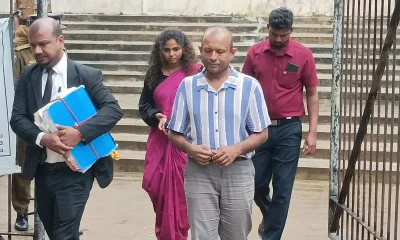
 News5 days ago
News5 days agoGota ordered to give court evidence of life threats
-
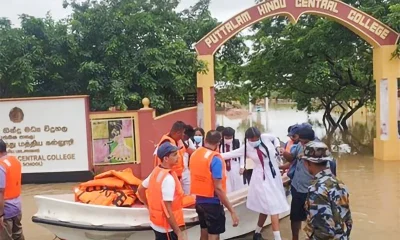
 Features7 days ago
Features7 days agoAn awakening: Revisiting education policy after Cyclone Ditwah
-

 Features5 days ago
Features5 days agoCliff and Hank recreate golden era of ‘The Young Ones’
-
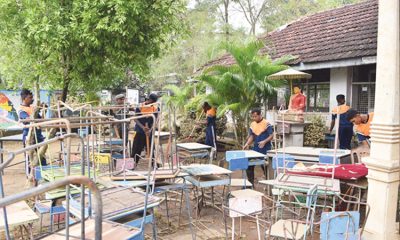
 Opinion6 days ago
Opinion6 days agoA national post-cyclone reflection period?




